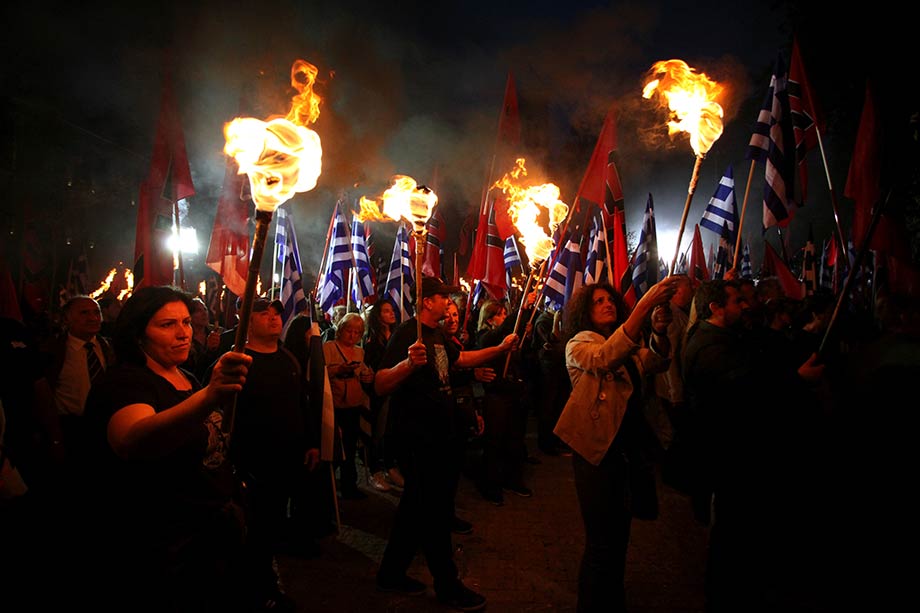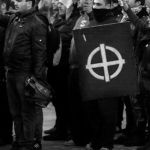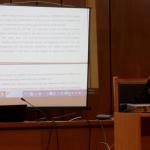Golden Dawn members and supporters at a rally in Athens, Greece on 29 May 2017. Giorgos Georgiou/NurPhoto/SIPA USA/PA Images. All rights reserved.
Source: openemocracy.net
What is at stake with the Golden Dawn trial?
The Golden Dawn trial, held in Athens, started in April 2015: the “biggest trial of fascist criminality since Nuremberg”, a unique penal trial of 69 defendants, among them 18 members of the Greek Parliament, all elected on the Golden Dawn ticket. The major accusation is based on Article 187 par. 1 of the Greek Criminal Code that defines the nature of a criminal organisation. Besides this, three more serious criminal offenses are also bought before the court: the murder of Pavlos Fyssas, an anti-fascist rapper; an assassination attempt on Abuzid Embarac, an Egyptian worker; and assassination attempts on members of the Greek Communist Party.
The Golden Dawn’s line of defence is not to deny the criminal offenses. Indeed, that would have been irrational since these are undeniable facts. Instead, the objective of the defence is to plead that the perpetrators themselves bear sole responsibility for these crimes and therefore the Golden Dawn leadership is not involved. Yet, paradoxically, two years after Fyssas was assassinated, Nikos Michalokiakos, the leader of Golden Dawn, accepted “the political responsibility of this murder”.
By the end of 2107, 210 days of trial had already elapsed. On 8 January, the first day of the trial for 2018, I was invited by the civil party to testify. The objective was two-fold.
First, I was to demonstrate the vertical hierarchical structure of the organisation that does not allow any ‘liberty’ to its members. Members of the party engaged in criminal activities with specific target groups in accordance with a political strategy designed by the leadership and executed according to an operational plan. This, we hoped to argue, is why the Golden Dawn is not a political party but a criminal organisation operating within the core of a political party. Only if Golden Dawn is recognised as a criminal organisation may it be legally closed.
The second objective was to show the racist motivation of the crimes. Although this might sound easy, in Greece there is no judiciary culture of investigating the motivation of such crimes. Acts are punished and that is it. Yet, a racist crime does not target someone for something she has done but for something that she is. Such crimes are a far more serious threat to public order than ordinary ones. It is only in 2014, that the Greek Criminal Code was amended to introduce racist motivation as an aggravating circumstance of a criminal offense.
What follows is the substance of my witness statement.
The Nazis’ strategy of tension
The year 2012 was a crucial turning point in the history of this once marginal party. The 7% it gained in the double parliamentary elections held that year fed its most toxic aspirations, as one Golden Dawn MP revealed to the BBC in October 2012:
“The Greek society is ready for a new kind of civil war. On the one side there will be nationalists like us, and Greeks who want our country to be as it was, and on the other side, illegal immigrants, anarchists and all those who have repeatedly destroyed Athens”.
The careful reader will ascertain that the war will not be against the degenerated political class or even against the Left who covets the power (although the term “anarcho-leftists” is common language for Golden Dawn). These are not the enemy. The enemy are the anarchists and immigrants, a blend that has already been targeted as intolerable for the Greek society as a whole and, par excellence, for the Greek police. For Golden Dawn all immigrants should be treated as illegals, so the reference to their status should be understood to potentially include the entire immigrant population in Greece.
For Golden Dawn all immigrants should be treated as illegals, so the reference to their status should be understood to potentially include the entire immigrant population of Greece.
This policy pertains to the historically proven formula of right-wing extremism, the strategy of tension. It is a strategy that feeds the fear of people against a particular group, dividing and manipulating public opinion by means of intimidation, propaganda and provocation. As such, the reference to “civil war” should be understood as more similar to the Italian experience in the 1960s-1980s than with the previous Greek experience. The systematic attacks against immigrants by the Greek neo-Nazi assault battalions have sought to coerce the victims to a violent response, and to impel anarchists and parts of the radical Left to mobilise.
Then, when the enemy of Golden Dawn slithers into this confrontation, the conditions will ripe for everyday people and, crucially, the Greek police to ask and answer the existential question: who is the enemy? “Nationalists”, or out of control “anarchists who confederate with the invaders of the nation, illegal immigrants”? Undoubtedly, in this case, the answer to this dilemma is more than simple.
In September 2013, Golden Dawn lost control of this strategy by murdering P. Fyssas. In their arrogance, they simply went too far.
The racist crime: a murder as a catalyst
The murder of Pavlos Fyssas acted as a catalyst for the characterisation of Golden Daw as a criminal organisation that combines national-socialist ideology with mafia-like practices. Up to that point this organisation had spread fear and its ideology of hatred without facing serious obstacles, while parts of Greek society had proved to be ready to adopt, or accept, its methods and ideology.
Following the death of Pavlos Fyssas, the Hellenic League for Human Rights issued a press release entitled “The perpetrator does not simply belong to Golden Dawn. Golden Dawn is the perpetrator”. This statement aimed to demonstrate that apart from the individual responsibility for homicide under penal law, there was also the issue of confronting a criminal group, as stipulated in the provisions of the Greek Penal Code. The Hellenic League for Human Rights had first made this argument when a Pakistani worker, Sahtzat Loqman, was assassinated by Golden Dawn members, long before the murder of Pavlos Fyssas.
The Greek legal framework includes general provisions covering individual participation in criminal acts (as perpetrator, mastermind, direct or simple accomplice) but also provisions for participation in a criminal organisation. Golden Dawn is proud of its strictly hierarchical and disciplinary organisational structure, and within it spontaneous, unplanned, or individually inspired operations and actions are forbidden or out of the question.
Looking at the cases that have been taken to court or which have been reported to the Racist Violence Recording Network (created in 2011), it is also evident that the structure, operation and modus operandi of Golden Dawn is fully reflected on a number of illegal actions and practices. For example, in order to murder Pavlos Fyssas, a large number of people – around 30 – were mobilised within a very short period of time and they all appeared to be well-prepared for criminal action; even the murderer was especially called for that action while at home watching a football game!
All these elements – a coordinated network, readiness to action, the relation between those giving and those receiving orders – fully constitute the offense of establishing a criminal organisation, as also put forward by the original report of the State Attorney in 2013.
“…The military structure, the absolute hierarchy, breaching of which [Golden Dawn] induces cruel to the physical integrity up to inhuman and degrading to the personality of the offender implications. (…) The recruitment of so-called Assault Battalions is made by persons who have specific physical qualifications, have been trained properly and under extremely harsh conditions that bear a resemblance to the education of men serving in elite units of the Armed Forces of the country. It should be noted that the selection of persons with knowledge of martial arts is of high priority”. (…) The charter of the organization “explicitly defines the segmentation of the superior operational from the political wing, the leading group of the two wings was common but the authority of the leader was absolute, according to the Hitler’s doctrine ‘Fuererprinzip’ his command for action or approval to a minor action was sacred and non-negotiable. In the opinion of persons of ‘GOLDEN DAWN’ those who do not belong to the ‘the popular community of the race’ are sub-humans. In this category belong foreign immigrants, Roma, those who disagree with their ideas and even people with mental or physical disabilities.” (…) “By implementing the charter’s ‘principles’ and goals of this criminal organisation dozens of offenses were committed (…) “the most serious of which are listed with references to the relevant indictments of justice: attempted murder, intentional homicide, attempted murder, robbery, explosions, offenses relating to explosives, heavy intended physical damage. (…) In particular, it should be noted that in certain cases, the number of which may be higher, men of the Greek police assisted or in the best of cases tolerated organization’s members to commit various criminal blameful acts, a fact that should be examined thoroughly”.
The criminal organisation as the political party’s core
European political history is familiar with the phenomenon of political parties that operate lawfully, yet are either favourably disposed toward or collaborate with illegal organisations, described as “criminal” or “terrorist” by the current legal order. These parties are, in principle, political expressions of ethnic radicalism and act as the political wing/branch of an outlawed cell. Notwithstanding the obvious inconsistencies with these parties, Golden Dawn is a case that challenges the traditional division of relations between the “cell” and the “political wing”. The reason is simple: in this case, the cell and the wing coincide. The criminal organisation is (in) the political party. Indeed, the criminal organisation is the hard core of the party. Conversely, certain political party structures coincide with those of the criminal organisation, since certain of its members engage, under strict hierarchy and coordination, in illegal acts due to the fact that they are its members. This explains why some members of the Golden Dawn could be equally regarded as members of the criminal organisation, whereas others not.
This peculiar situation of a political party-criminal organisation can be attributed to a number of reasons. In Greece, given the recent historical past of coups d’état, there is a broad political culture of intolerance to any form of state intervention in internal party affairs or the prohibition of political parties for ideological reasons. As a result, a party that would have been declared illegal in most European countries enjoys the privilege of legitimate operation in Greece. As Catholic priests are allergic to legalising abortion, the Greek legal world is allergic to ceasing the operation of political parties! This ‘allergy’ has been well handled by Golden Dawn.
Democracy is generous, not foolish. It can and will protect itself against its enemies.
For years, major departments of state institutions, charged with ensuring public order, have not been prosecuting members of Golden Dawn, even when they were provokingly committing crimes. I particularly refer to the police and the judiciary, but also the Orthodox Church and the Army. The infiltration of the Greek state apparatus by the far-right is not new for us here and has been recently documented. It should rather be regarded within the legacy, and continuities, of the authoritarian and anti-communist past of the country.
Last but not least, for a considerable period of time, certain circles of the conservative establishment were expecting a ‘serious’, less violent, Golden Dawn as a kind of ‘sustainable solution’ within the fragile Greek political system. This approach has been shared by a good part of the mainstream media and the conservative party, itself. The same surroundings were very eager in promoting the so-called ‘theory of the extremes’, the one extreme being SYRIZA, the other being the Nazis. Golden Dawn had been equally useful in order to fulfil the necessary conditions of the plausibility of this dangerously ridiculous theory.
What’s for sure is that unlike similar formations in Western Europe, Golden Dawn has never been a party of outsiders, a pariah organisation. It has always had its supporters within the police, the army, even the judiciary and the church. This did not change when the organisation made it into the Greek parliament. Its action was simply split in two parts, a legal-public and a clandestine-criminal one – that is, a ‘political’ and a ‘military’ branch, both under the same leadership.
The outcome of the case?
The members of Golden Dawn are not in the dock for their ideas but for their actions. These actions were not due to drunkenness or to the heat of the moment, but to their –unfortunate for them and all of us – membership in an organisation centred around an ideology targeting humans as ‘sub-humans’. These morbid ideas led to criminal acts that no state should or could ever leave unpunished.
The completion of the Golden Dawn trial – the only proper state response to its criminal essence – should have only one outcome: the recognition of Golden Dawn as a criminal organisation. This will close the cycle of irresponsible laxity of Greek authorities vis-a-vis a statutory enemy of democracy. Thus, when this trial comes to an end, hopefully in 2018, with an irrevocable verdict that Golden Dawn is a criminal organisation disguised to a political party, then the Greek Cessation Court will have to prohibit its participation in the next national elections. This, of course, will not solve the problem of the penetration of national socialist ideology into enclaves of Greek society, but it will be a big blow and will offer a strict paradigm for the future: democracy is generous, not foolish. It can and will protect itself against its enemies.
The Golden Dawn trial concerns every democratic citizen and its outcome will be a stepping stone for the defeat of extreme right-wing radicalism across Europe. It is a major event for Greek democracy and beyond.
Dimitris Christopoulos is president of the International Federation for Human Rights. University professor and activist, he works particularly on issues related to migration, citizenship and other human rights issues. Find him on @dichristopoulos.









